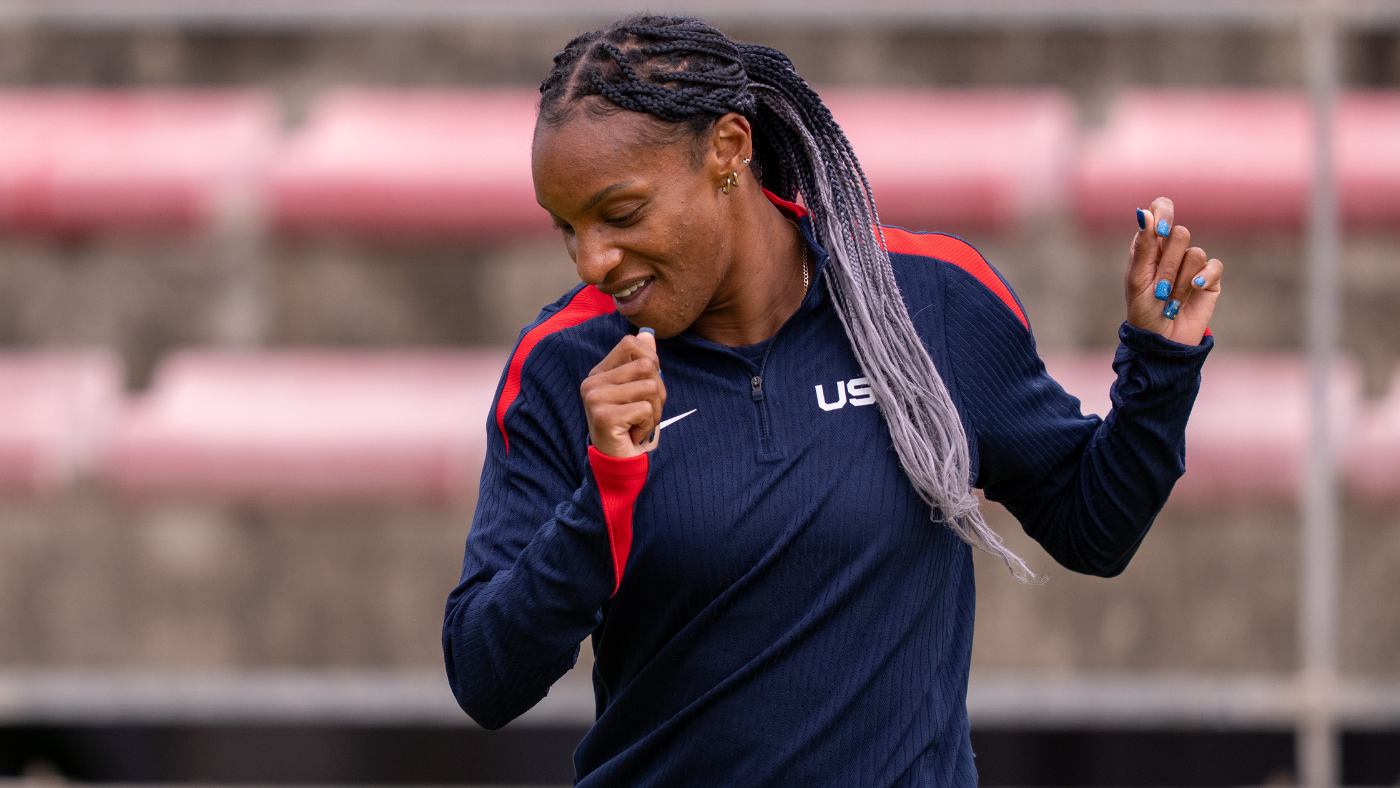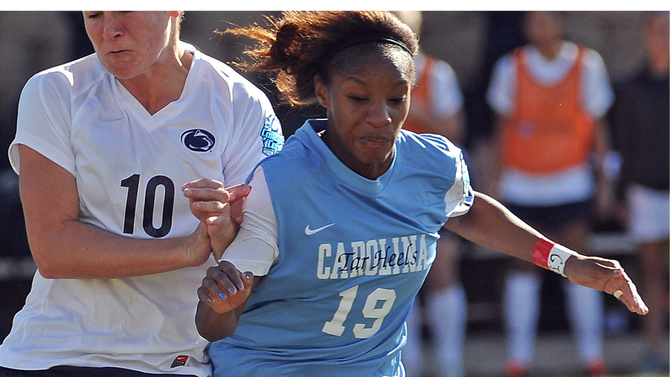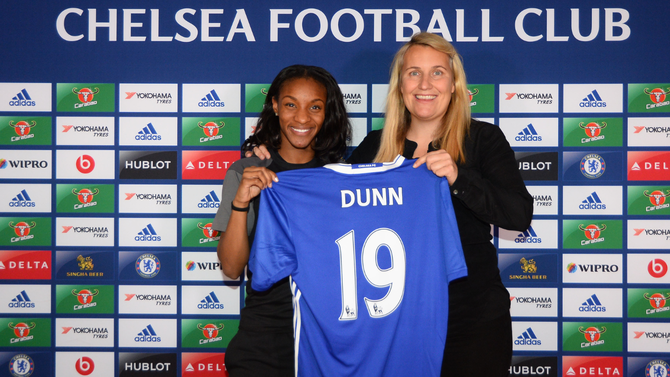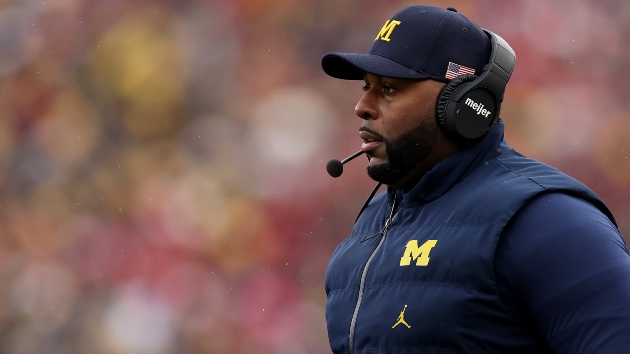U.S. women’s Olympic soccer: Crystal Dunn’s long road to becoming the USWNT forward she always wanted to be
Written by CBS SPORTS ALL RIGHTS RESERVED on July 23, 2024


An unpleasant thought popped into Crystal Dunn’s head several months ago: “Oh my goodness, is this how it’s going to be for the entire year?”
It was an usually pessimistic viewpoint for the veteran, who has maintained a professional and joyous reputation for much of her career. The words “fun” and “bubbly” are usually associated with her, and her teammates point to her habit of dancing spontaneously at training as one of her defining features. She did, though, have a good reason to take a downbeat tone.
For the first time since the early stages of her career, uncertainty followed her like a shadow. The longtime NWSL standout signed for NJ/NY Gotham FC as a free agent last winter, a move that felt like a perfect fit because the native New Yorker was finally playing near her home base for the first time in her career. Yet, she struggled to crack Juan Carlos Amoros’ starting lineup to start the season. The situation was not much clearer with the U.S. women’s national team — a period of rebuild meant that every spot on the team was once again up for grabs, including her years-long hold on the left back spot.
There are few challenges Dunn has not overcome since winning her first USWNT cap in February 2013 and getting drafted by the Washington Spirit a year later. The 32-year-old has a remarkable knack for adapting constantly, surviving just about everything from new teams, coaching changes, dramatic tactical shifts, the demands of an increasingly competitive women’s soccer landscape and the highs and lows of motherhood as a female athlete.
It means Dunn has rightfully earned her spot on the USWNT’s truncated 18-player roster for the Olympics, successfully staying in the fray despite head coach Emma Hayes intentionally curating a more youthful roster as a response to the team’s early exit at last year’s Women’s World Cup. Dunn’s a one-of-a-kind addition based on her talents alone, but her chameleon-like ability to find her place in an ever-evolving landscape makes her uniquely valuable to a U.S. team that has lacked an ability to shift when things are not going according to plan.
The best news for Dunn, and therefore everyone around her? Things finally feel like they are falling into place in a way that suits her. Not only did she find a way to break into Gotham’s lineup before leaving for the south of France, for the first time since 2017, she is primarily being tasked with playing as a forward for the national team — something she has long wished for.
“I’m always, I feel like, reinventing myself,” Dunn said. “I think I’m somebody that has played, historically, as an outside back on the national team. I play club soccer as a forward, so I’m always somebody that’s adapting at all times. I’m used to being moved and being given new roles and being asked to basically put my game on display in different positions and I think this [time] definitely feels different.”
By pressing sign up, I confirm that I have read and agree to the Terms of Use and acknowledge Paramount’s Privacy Policy.
Please check the opt-in box to acknowledge that you would like to subscribe.
Thanks for signing up!
Keep an eye on your inbox.
Sorry!
There was an error processing your subscription.
Dunn was a revelation from the start


“There wasn’t a lot of homework to do on Crystal Dunn,” Mark Parsons said plainly about selecting Dunn first in the 2014 NWSL Draft ahead of his first full season in charge of the Spirit. “You got the number one pick, you’re only picking Crystal Dunn.”
Though Parsons still drove a few hours to catch a glimpse of the University of North Carolina senior before drafting her, Dunn’s résumé spoke for itself. She was the ACC Offensive Player of the Year that year, and the year before won the Hermann Trophy, the NCAA Women’s Soccer Championship and the U-20 Women’s World Cup in 2012. Her flair for the attack was quickly noticed by her teammates, including then-Spirit player and future national team colleague Ali Krieger, who was on the 2019 Women’s World Cup-winning team with Dunn and calls her a close friend because their sons go to school together.
“At the beginning, I always wanted to give her the ball because you knew that something good was going to come out of it and she could just create on her own,” Krieger said. “She could just create any opportunity in the attacking phase of the game, but also she works her butt off defensively so she’s an all-around amazing player and she has such a long leash for me. You could kick the ball out of bounds 18 times out of 20 and I wouldn’t care. I’m going to leave her on the field because there’s that one more minute or two moments where you’re going to get from her that it’s going to make the biggest impact in the game.”
It came as no surprise that the national team came knocking in her rookie year, though there was just one problem — the player pool was more in need of an outside back than it was an attacker. Dunn had some defensive experience, too, winning the ACC Defensive Player of the Year award in her freshman year at UNC, and so Dunn got some reps on the wing in the NWSL.
“I understood what their vision was,” Parsons said. “I think Crystal was going to do anything to be able to break into the national team. … If the national team felt that a player was of this position, you want to support that. You want to support that because at this time, if you’re playing on the national team, you now have a career in football financially and a lot of opportunities open up and you absolutely have responsibility to support the person in their career as well.”
Parsons, though, felt that limiting her to just one flank of the pitch also limited her invaluable impact on a game. The following season, Dunn returned to her attacking roots.
“We made the brave call,” he said. “I felt that we had to keep her involved more often and we played her as a false number nine. We put her as the number nine, but knowing she would want to come free and get on the ball and run and dribble a bit like what [Lionel] Messi had done for Barcelona back in 2008. … Within a few games, I said to myself, ‘I don’t know how anyone can stop her,’ because if they get tight, she can just turn or she can run behind them. If they stand off, she starts dribbling.”
Though spots on the USWNT are hardly ever guaranteed, many felt like Dunn did enough to crack the 23-person squad for the 2015 Women’s World Cup in Canada — Dunn included.
“2015, that was hard,” Dunn said. “I probably saw both sides, looking back — I could make the team, I could not make the team — but as a player, you’re still like, ‘I want to make the team and I think I truly believe that I can,’ and then you get the phone call saying that you didn’t and you’re just like, ‘Dang it.’ I really, really believed that I could.”
Then, Dunn decided the then-USWNT head coach Jill Ellis would not make that choice twice.
“I was so young in my career so that I was like, I’m gonna put my head down and grind it out,’ and I know I have many years ahead to just invest in myself and turn this thing around,” she said.
Turning things around
“It was incredible to see a player like that, so young, to be knocked down because she didn’t make the World Cup team, to then come back and use that as fire to really perform well,” Krieger recalled. “That takes such mental strength and yes, on the physical, emotional side, you have to be able to perform but the quality that she had and just the way that she thought about where she wanted to be. She did want to be on the national team, she did want to play in big tournaments and so she created that for herself.”
Dunn turned that disappointment into a 15 goal season, winning the NWSL’s golden boot and MVP awards that year. It was one of the most memorable individual performances in the league’s history and in some ways the origin story for Dunn’s journey to becoming one of the most accomplished and impressive players in the game. Parsons calls back to Dunn’s game-winning goal at the Chicago Red Stars in August 2015 as an example of her mental strength.
“We were 1-0 up,” he remembered. “It’s such a horrible, hard game and then Chicago scored in the 80th minute so it’s 1-1. I never, never thought we would concede, and it’s the dying seconds of the game. I actually Googled this a couple years ago because I was telling this story and I said, ‘I’ve got to show you this’ to a friend or something … It’s the last minute. We clear the ball it goes down the wing. Crystal chases this ball that she should never really chase, it forces the Chicago player to kick it out. We then take a throw-in, it gets back to Crystal, she goes on a dribble like she always does and played this left-foot shot and it was like the slowest shot I’d ever seen, but it was right in the corner. … It goes in, we win 2-1. My point is, we weren’t good that night in a on a horrible pitch against a really direct, ugly team and she stood up and said, ‘Not today. We’re coming out here with three points,’ and for me that’s world class in talent but world class in character and mentality.”
Dunn’s remarkable individual ability was then coupled with team trophies as a professional. She played for Hayes at Chelsea in 2017, winning the FA WSL Spring Series before returning to the NWSL and winning back-to-back NWSL Championships and Shields in 2018 and 2019, lifting a Women’s World Cup title in between. By the time Dunn and Parsons reunited in 2020 at the Portland Thorns, she was not just an outstanding individual player — she was a winner, and acted like it. She fit in well in the Pacific Northwest, where Parsons had assembled an all-star roster that included Dunn’s past and present national team colleagues Becky Sauerbrunn , Meghan Klingenberg and Sophia Smith, as well as international soccer’s record goalscorer Christine Sinclair
“We wanted her talent but we also wanted her winning mentality and ability to drive standards,” he said. “That’s who we got. It’s the same fun, bubbly, great personality. People gravitate towards her but she also worked tirelessly every day and knew what it takes to be successful. She did that and led by example and that rubs off on others and she wasn’t afraid to tell people to work harder, to run more, to track back, to play the extra pass rather than shoot.”
She won the NWSL Challenge Cup and Shield in 2021 alongside an Olympic bronze medal with the U.S. and then picked up an NWSL Championship winner’s medal in 2022 , the same year she gave birth to her son, Marcel. As she rose to the top of the game, though, the conflict between her tactical duties became more present. While Dunn played as one of two No. 10’s in Parsons’ diamond midfield, she was still playing left back for the national team. The detail-oriented Dunn who pushed her teammates to be better was just as rigorous with her own performance during that time.
“This actually now was a big challenge for Crystal and a big challenge for us to help her,” he said. “When she was preparing for [national team] camp, she was very diligent preparing to fix into the mindset, be proactive [in] getting into the mindset of a fullback again. Sometimes she would even do reps. She would ask to do some passing reps on that last day before she would fly off, just to get onto the fullback and receiving the ball and passing. When she would return, we would be unbelievably proactive. Here’s clips, here’s where you’ve been successful, let’s get you back in these positions and get you back into playing as a 10.”
Dunn’s switch to Gotham for the 2024 season meant she took on another tactical adjustment, this time as a wide forward for the first time in her career under head coach Juan Carlos Amoros. Despite being the team’s first marquee signing after surprisingly winning the 2023 NWSL Championship, she did not book a regular starting role until late spring. These things are rarely inevitable and yet with Dunn, she puts in the work to earn a favorable scenario more often than not.
“We play in a very complex system and it happened as well with some of her teammates, and it’s difficult to adapt,” Amoros said. “I think Crystal now understands a lot what we want to do off the ball, what we want to do on the ball and now she needs to think less on the pitch and be more herself and I think that’s what’s going to help her to perform at the level that she is performing [at] now, which is also higher. So from here, credit to her because it wasn’t easy. It’s difficult adapting to a new team, new teammates, new coaches, new club and now starting to be one of the players that is taking more responsibility.”
Parsons attributes Dunn’s mastery of the many tactical challenges thrown her way to her impressive ability to read the game.
“Her game intelligence is exceptional,” he said. “Her ability to scan and know what’s around her means that you can play a pass into her when she has space and she’ll know what to do because she knows what’s around her. You can play a pass to her where she’s marked tight, player for player, and she will be able to take the touch exactly away from where that pressure is, where that player is. Her feeling for the game is exceptional.”
The combination of Dunn’s unbelievably wide-ranging skillset and her consistent success, as well as genial personality, means she projects a sense of ease despite the difficult tasks she’s had to master over her career. It makes her uniquely qualified to actually fill in as a forward for the national team, something she had not done in seven years but returned to in style last month with a goal in the U.S.’ 3-0 win over South Korea.
“She’s so open-minded and willing to learn in all areas, which I think the outsiders don’t see as much,” her USWNT teammate Trinity Rodman said. “Also, I think coming from the back line and even playing midfield at her club, you get the perspective from those positions that she’s played so we have a lot of conversations as forwards but also she has that point of view as a defender, as well, so I’m also able to learn off of that and base my movements and runs off of how she’s tried to defend us in the league in the past, so it’s an interesting take, for sure.”
The longevity of Crystal Dunn
“It is brutal. Honestly, the amount that you endure — mentally emotionally, physically — it’s something that I can’t even explain and articulate,” Krieger said about the uber-competitive nature of competing on the USWNT. “It’s the best of the best, fighting for your job, fighting for your position. Every day matters. Every meal matters. The sleep matters. The nutrition matters. The way you perform, the way you show up, the way you get dressed — it all matters. You’re on your best behavior all the time. … Sometimes, it’s easy to get there, but it’s not easy to stay there.”
It is a testament to Dunn, then, that she is one of the few members of the so-called old guard left on a refreshed USWNT. Everyone will point to the fact that Dunn’s ability to play a wide variety of positions makes her “gold dust,” as Parsons describes it, on an 18-person roster. The 32-year-old is settling well into her role as a veteran on a new-look team, helping to foster an environment that allows “everybody to feel welcomed and to feel so valuable,” which she admits was not always the case in the past.
“I think I definitely lead in a different way than other players, but I think for me, it’s being personable. I think people want to come up to you and ask questions when they feel like you’re at the same level as them,” she said. “I think it’s important to always have that mutual respect between each player that exists in the environment, and it’s important for me to also bring light to the group, to have some laughs.”
Dunn practices what she preaches for herself as a player, as Hayes described it.
“I know Crystal’s someone, like every player, they want to feel valued,” Hayes said about Dunn as a player, something she refuses to detach from Dunn the person. “No matter what, she contributes to the team. I know it will be her absolute everything. She’s demonstrated all the things you need to perform at the top level time in, time out and I don’t think you’ll see anything different from Crystal. My job is to continue to find the best version of herself.”


Finding the best version of Dunn, in some cases, requires Hayes — mother to a six-year-old son, Harry — to impart parenting advice en route to media events, much like one in midtown Manhattan this month.
“My son is going through his three-nager time,” Dunn said about her two-year-old, Marcel. “It’s like a little past terrible twos, where now you say no to him about the simplest things, like, ‘No, you can’t play with a sharp knife because that is really dangerous,’ and he’ll throw himself on the floor and just be like crying hysterical for like 30 minutes. I can deal with the 10 minutes kind of thing but now it’s a bit longer but she was giving me some words of advice, actually, on the way here and I told her, I was like, ‘You need to record yourself and then whenever I’m going through it as a mom, I’m gonna hit play and be like, what would Emma tell me to do at this moment?’ She’s obviously great with just sharing little tidbits.”
Hayes’ well-known ability to embrace her players as athletes and people suits Dunn well. The USWNT’s resident bright personality, she has always been public about her belief that playing soccer should be fun. It seems in direct conflict with the USWNT’s long-lasting competitive nature, but it was something her teammates said they were missing at last year’s World Cup. Dunn was happy to report that the joy has returned.
“I think the coaching staff in place with Twila [Kilgore, USWNT assistant coach] did a really good job of just keeping us focused but also letting us have a little bit of fun with it,” Dunn said about the post-World Cup period, led by Kilgore as Hayes finished out her time with Chelsea. “At the end of the day, we’re here to win soccer games, but we need to have fun doing it and that means creating that competitive environment that’s going to bring out the best of us and not just make us so uptight about making mistakes and being afraid of failure in a sense.”
Dunn’s return to the USWNT’s attack is a perfect mix of fun and feeling, valued by the coaching staff in charge, eliminating the extra work of transitioning to and from club and country. Even if Dunn will likely be one of the first names off of the bench in France rather than a starter, the optimism with which she speaks is hard to miss.
“I’ve wanted to be a forward for a long time on the national team,” she said. “Didn’t think I’d get this opportunity. I was completely okay being an outside back for the remaining time as a national team player and I think it speaks to Emma as a coach, just trusting players to be able to stick to new roles and I’m really honored that she trusts me to help lead this team.”
It also hard to ignore the self-assuredness Dunn carries herself with at this point in her career, the uncertainty of the last few months feeling like a distant memory.
“it’s really nice to be able to be surrounded by people who can just keep you grounded and keep reminding yourself that soccer is what we do,” Dunn said about being based near her Long Island hometown. “It’s not exactly who we are and I think that’s been the biggest takeaway this year is that as much as I’m hard on myself and always wanting to be the absolute best that I can be, I think it’s also important to surround yourself with people that are gonna be like, ‘You’re good. You’re okay,’”
The post U.S. women’s Olympic soccer: Crystal Dunn’s long road to becoming the USWNT forward she always wanted to be first appeared on OKC Sports Radio.






